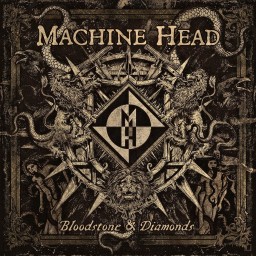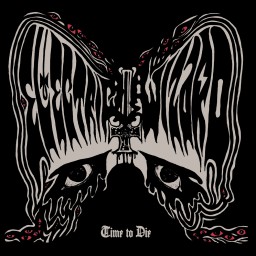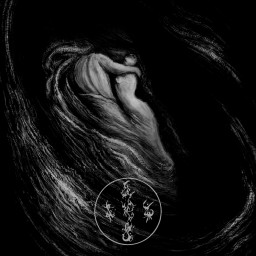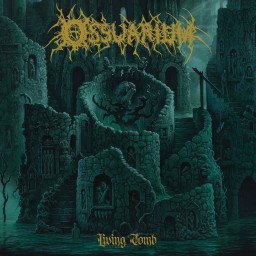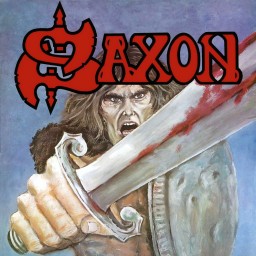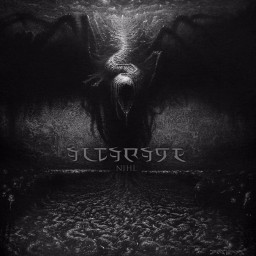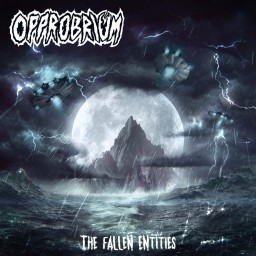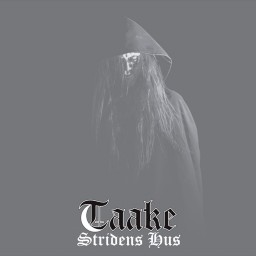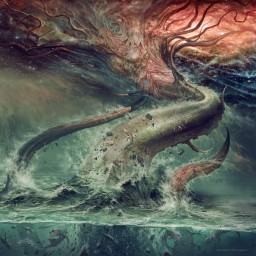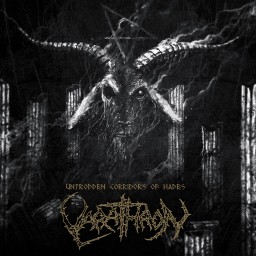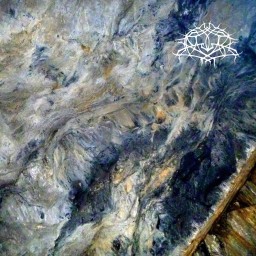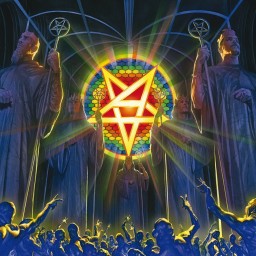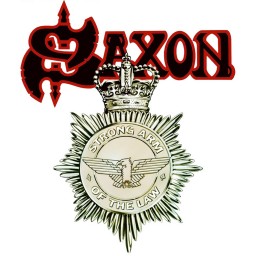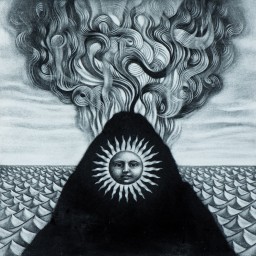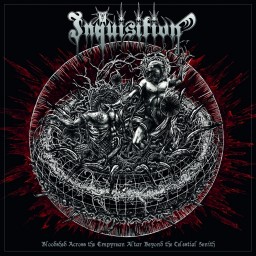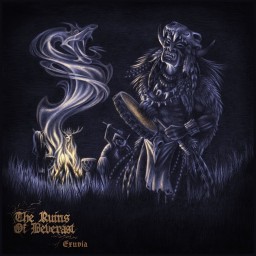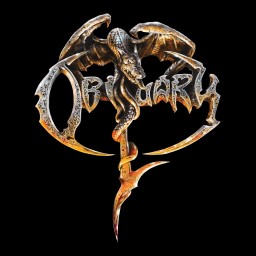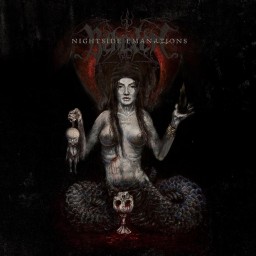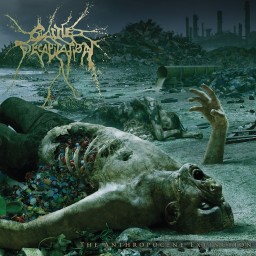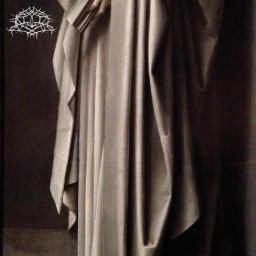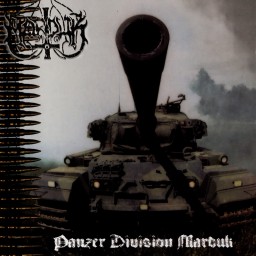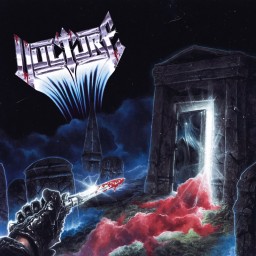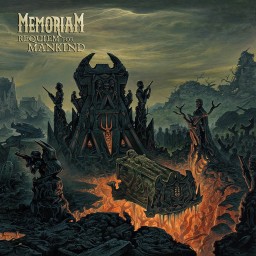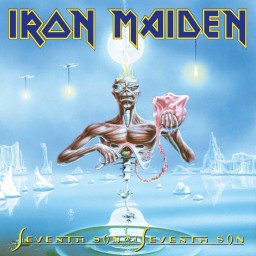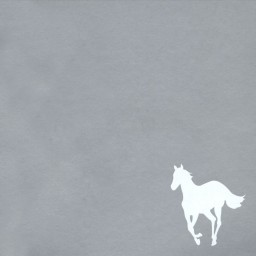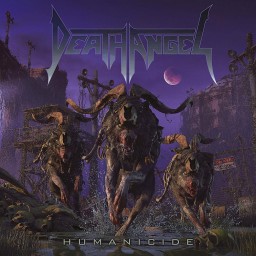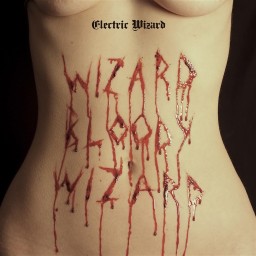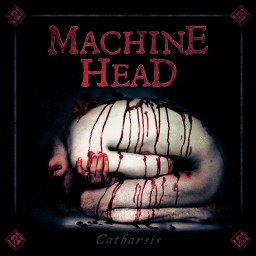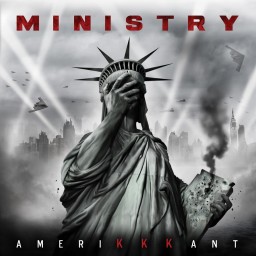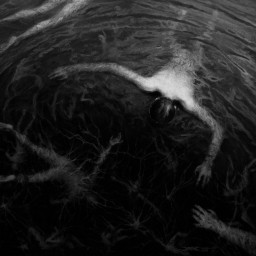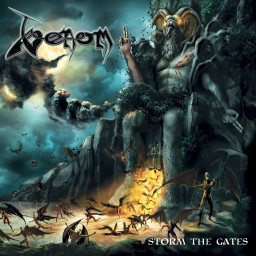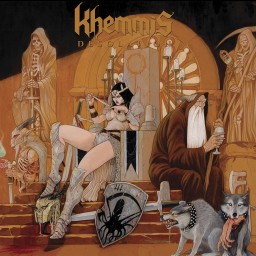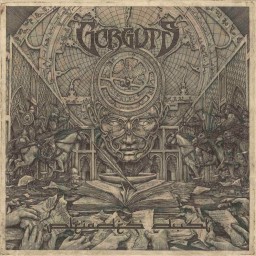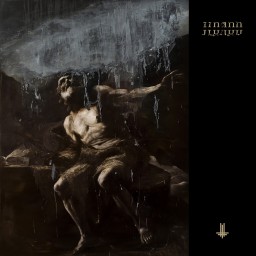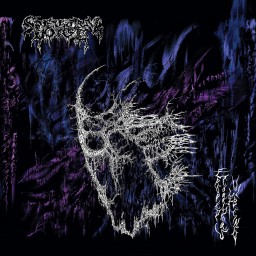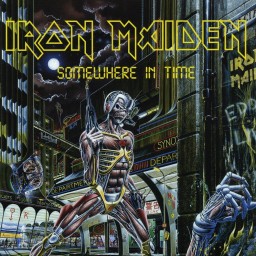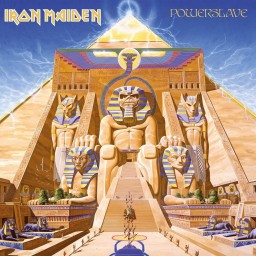Vinny's Reviews
For all the hate I hear vented on forums at Machine Head for being "unimaginative Metallica riff copying pish! Debut rocks but been downhill since, blah blah" I wonder if there are actually 2 bands with the same name and I am fortunate enough to be hearing the better version of the two?
2011's "Locust" was superb - patchy towards the end but so full of energy and pure raw metal intensity that to recognise it as anything other than a top notch release is ridiculous. With Duce gone you could have been forgiven for thinking "Bloodstone & Diamonds" would be a sub-par effort made by a band struggling with the loss of such a key member. The departure of founding bassist Duce energised Machine Head and the new album was full of riffs, hooks, chops and (again) strings! It was balanced to boot, the romp being mediated by some effective and deliberate pace changes be that mid song or to build a track.
In terms of a mainstream metal album you will find nothing to rival this in the whole of 2014, Flynn has a direction and vision that he has kept going now for eight albums (at time of this release) and whilst "Bloodstone.." does little to reinvent the Machine Head wheel what it does do is cement the expectations fans have come to expect from one of metals long standing groups. Yes the song lengths do need a trim in places but this is never going to be "Burn My Eyes", anyone sat around waiting for another album on par with the debut needs to move the fuck on and realise that for any band in 2014 "Bloodstone.." is an excellent release. Recognise "BME" for what it is and celebrate it for what it was but to benchmark a whole career worth of releases against such an opening release is ridiculous and pointless.
Look instead at the glum. misery of "Sail Into The Black" or the epic proportions of "In Comes The Flood" and see that although the hints of nu-metal are still in the throat of Flynn or on the groove of some riffs ("Beneath The Silt" especially) this was a band matured and perfectly at ease with its standing in the world of metal music. The guitar work on "Bloodstone..." follows on superbly from the brilliance of "Locust" - I am a sucker for dueling six strings and so am very fucking happy with the widdly bits on display here!
Genres: Groove Metal
Format: Album
Year: 2014
Taking "Black Masses" at face value as a tame throng of occult ridden doom, you could be wondering exactly where Electric Wizard could take us on their next opus? The fact is nobody sat waiting for this record expecting any massive shift in style, or change of pace or sound, so it could be argued that Electric Wizard's task was made easy by the simple act of working within the restrictions of the very genre in which they sit.
So where did the group taken us this time? How do you follow up a solid yet mediocre slab of doom like "Black Masses"? Simply put you just ramp up the darkness, ramp up the evil and down tune a bit more. To take your slow and heavy, established sound and find renewed fire in you belly to take it onto another level all together takes effort and thought and that is obvious in abundance on "Time To Die".
As album opener "Incense For The Damned" begins it's obvious from the off that the darkness that seeps from every riff and vocal is meant to be all consuming like getting a big hug off Count Dracula himself. Throughout the record the band have elected to run with voice over footage which sits really well with the atmosphere and aesthetic of the album as a whole.
As a whole opus it's a lot to take in at one sitting and it's only when you sit back and take in the nightmarish effects of the vocals married with the haunting melody and crunching doom of the sounds that you start to appreciate the experience better. Take a time to sit jaw agape at the thundering weight of the opening to "I Am Nothing" as the whole band bludgeon your skull into dust with as heavy a slab of doom as you'll have heard in along while.
Throughout the fuzz-drenched hour and a bit Jus Osborn whines and wails over the plodding bestiality of Liz Buckingham's riffs as Clayton Burgess and Mark Greening show their importance in the sound as a whole, underpinning everything perfectly. If you have ears you'll find "Time To Die" a massive step up from "Black Masses", in fact it's on another level altogether, a different fucking planet.
Genres: Doom Metal Stoner Metal
Format: Album
Year: 2014
The previous outing from Aevangelist was a difficult affair for me. I understood the rationale behind the direction of the record and the stylistic chops and changes that they tried to mix into one big dark, ugly and chaotic pie. Unfortunately, "Omen Ex Simulacra" lost me. Instead of being enveloped by it's swarming atmospheres and looming darkness I found myself sitting back and looking consistently rather puzzled. Part of the attraction of bands like Aevangelist are their absolute inaccessibility, but "Omen.." was a journey too far for these ears and although I have revisited just to make sure I am not being a knob I still don't remember much about it.
"Writhes In Murk" uses atmosphere much better than the previous effort. There is no sitting around waiting for the threat of squally, chaotic and pounding DM as a synth or drone teases you with the potential, in the main the music is more in your face yet has the edge of menace as opposed to a constant reminder. Opening track "Hosanna" gets straight in your face, wraps cold hands of impenetrable darkness around your head and snogs you with a thick, black and slimy tongue thrown down your throat for good measure. This is the tone for the rest of this particular romance as track after track engulfs you, taking you along on every blast of power violence, wrapping your body in dark ambience, tearing at your flesh with sharp talons of black noise and smothering you with the records industrial, black DM.
By the time you get to the title (and final) track you are genuinely disorientated. Such is the pace and complexity of what is contained in these 8 tracks you will lose a whole hour (and then some) and will simply want to dive right back in and go at it all over again.
Genres: Black Metal Death Metal
Format: Album
Year: 2014
When it comes to death/doom, variety is not necessarily top of the average listener's appeal list. Usually when I review such a release I find myself typing "doesn't reinvent the wheel but does the genre justice with this solid offering" or words to that effect. Ossuarium's debut full length falls under that banner most definitely. Nobody is fucking around here with a saxophone to make the offering standout with some eclectic and unnecessary deviation from tradition. If you like your death metal doomy or your doom metal deathy then chalk up a tick in your respective box folks!
As predictable as the "Incantation influences aplenty on show here" references are, what "Living Tomb" does do is show some variety in terms of the band wearing their influences on their sleeves. Yes, Incantation is an obvious comparison but I also get the clumsy and cloying lead work of Autopsy in here too. There's also clever, atmospheric structures in places you wouldn't expect, like mid-track on the superbly titled "Vomiting Black Death" which remind me of dISEMBOWELMENT.
What is also obvious after a couple of listens though is the production job, in terms of how bad it is on the whole. It sounds like the rhythm section has cloth over it and yes, I get that the genre is supposed to sound gloomy but this isn't good gloomy, this is (slightly) muffled gloomy and that detracts from the whole experience unfortunately as I find it quite noticeable. The slower sections of most songs suffer more obviously with this and so I find this is where the brain switches off or goes wandering.
Let's not get too bogged down in production though as the skill of the band is still obvious and we can just imagine how strong the sophomore release is gonna be if they get that production/mix issue ironed out. The potential of Ossuarium is as huge as the riffs and as intense as the melancholic leads that guide on this dank journey. The artwork here depicts perfectly what you get on the record. Big looming structures, menacing atmospheres and ugly sounds (check out the guitar at the start of "Writhing in Emptiness"). These boys can write and play also and you will struggle to find better built death/doom this side of Spectral Voice and Tomb Mold, it just needs a better environment to really show all these good bits off a bit better.
Genres: Death Metal
Format: Album
Year: 2019
I rarely discover a band's discography in order of release. Often, I find my experience of a band starting somewhere other than their debut release. Saxon are no exception to this rule. My first taste of Barnsley's finest was "Power & The Glory" from 1983 (and I didn't hear it until 1989). I only got around to their debut full length about 4 years ago, some 3 decades after it was released.
At first listen it was a little disappointing. A bit tame for usually more extreme tastes as I get older perhaps. However, it has grown in stature over the past few years of occasional spins as part of the Original Album Series box set I picked up on holiday one year. The initial, pensive reaction to the mid-paced and bass heavy, ploddy NWOBHM esque, near cabaret feel was thankfully replaced on repeated listen with the understanding that this not only was a fine piece of late 70s hard rock but that so much of the sound that was to influence me throughout the 90s was literally dripping out of the speakers.
I actually quite enjoy the melodic and kind of mysterious opening to the eponymous debut. "Rainbow Theme" & "Frozen Rainbow" feel like the band aren't giving too much away too early on in the record/their recording career. The more upbeat "Big Teaser" is pure Yorkshire cock rock and by the time we are at the end of track four we have been treated to a variety of pace, skilled musicianship and harmonious band performances come the final throes of "Judgement Day".
There's little to not enjoy throughout side one. Yes, Biff's vocal range is limited but his ability marries perfectly with the tight playing of his band mates. It's hard not to chuckle through side two's penultimate track"Still Fit To Boogie" with it's defiant message of wanton youth a little tarnished by the delivery and the subsequent years, but Oliver and Quinn's guitar work on both rhythm and lead carry the track through superbly.
Don't get me wrong, "Saxon" is not perfect. Whether I am typing this in 1979 in red and black striped trousers or in my tracksuit bottoms in 2019 there's criticism to be levelled. For instance, it never quite feels exciting or moving even. It just plays well and quite safely in the corner. It is like a candle sat on a very big saucer, you don't mind leaving the room with it still lit for 5 mins because you know it'll be fine and won't run away with itself and spill wax all over your sideboard. For an eight track record there's remarkably a piece of filler present in closing track "Militia Guard". I mean it is played well enough and Dawson's bass makes it sound like every other track on here, but it is just oddly paced and feels a bit unnecessary.
Let's acknowledge though that this record is 40 years old this year. It might not be my favourite Saxon record and it might not even be my second or third favourite. It is however, still getting plays.
Genres: Non-Metal
Format: Album
Year: 1979
Rare indeed is it for a release to leave me speechless and reduced to little more than gaping jaws as my only sign of human interaction or response. The fact is that when I first heard "Nihl" my ears were first feasted upon by the two tracks alone that first premiered. I had no idea why Altarage had not appeared on my radar until then but thank fuck in the name of all that is unholy that they did.
Stunned though I was by the cavernous, murky depths of the two teaser tracks that plagued my head for days afterwards, I was still completely unprepared for how utterly monstrous the full product actually was. This ladies and gentlemen required me to forget all that I knew, indeed dismiss every common notion of the genre that I held because Altarage came with no rule book. Here be music of no particular form, just a writhing mass of pain, disease and overwhelming death.
I can't remember the last time I was floored by an opening track. The start to "Drevicit" is like a city full of monolithic, gothic architecture collapsing on you. It smothers you whilst simultaneously raining down blows upon your meek and pathetic existence. It doesn't just wind you, it tears the air from your lungs and presses its whole weight against your very soul.
And this is only track one. Of eight!
Second track "Womborous" was one of the two teasers I mentioned earlier. It has a thunderous structure like the march of an undead army. The riffs pummel you into submission like blows from an ancient, rusted Battle Axe. They leave jagged bits of flaked metal in your wounds that infect your blood with their coppery coloured menace.
There's no let up to this insanity, it is a constant darkness in your psyche, a raging tide of demonic abhorrence and ghastly intent. There are no corners to hide in, no crevices in which to take shelter. It is an all encompassing vortex that takes all in its path. The seeping horror of the intro to track 3 "Graehence" will have you clawing at your own eyes and ears in fear before the macabre tribal drumming renders you paralysed until the guitar just crawls over you. "Graehence" really does tease you with its varied pace and structure, never once letting you get your head around truly what is going on. Inevitably there are comparisons to be drawn with Portal here but this is something else. Even though you are listening to chaos it does have a discernable presence, a hellish rationale to its being and existence. As "Baptism Nihl" begins it sounds like an effort to re-acquaint you with this evil wizardry as though you needed more of your soul stripping away as you reach halfway on the album.
"Vortex Pyramid" is perhaps the best named track on here. It is a trap, a rising swirl of madness forcing you into a confined point of dementia. As I got to this point I noticed how "un-death metal" the vocals actually are. They are more like a ghoulish BM style which compliments the music perfectly. When the instrumentation creates something this disturbing you don't need guttural growls and gurns to accompany it. "Batherex" is the second of the teaser tracks, with its opening riff that sounds like a swarm of insects scittering down your bedroom window before it opens up into yet another full frontal assault. Seriously? The fucking guitar tone on this album alone should make you feel filthy and unwashed.
And so it continues as the ferocious ending of "Altars" gives way to the dreadfilled, looming build of closing track "Cultus". By this point the world has been black for over forty minutes and the sun may never rise again, your house has somehow decayed around you and that fluffy lovable pet dog you had has now been transformed into a full blown, bonfide HellHound. There's so much going on within the eight tracks on "Nihl" that you may never fully come to terms with the experience. The sudden end to the final track is reminiscent of a portal to the underworld suddenly closing, and even though your personal torment is over still somewhere the agony goes on, endlessly.
P.s. that fucking artwork!
Genres: Black Metal Death Metal
Format: Album
Year: 2016
There's not anything wrong with "The Fallen Entities" in terms of basic principals. It chugs like a death metal record should do. It chops at the listener with deft riffage like any death/trash record would do. It has gruff, Schuldiner style vocals that genuinely make me want to go and put on a Death record. Hell, it even makes me throw the odd claw shape with my hand and pull a silly face. It still sounds tired though, like a band just going through the motions. The fact that the majority of the tracks sound the same is kind of hard to dismiss, like the sheer effortlessness involved in just writing and recording quashed all creativity in the process.
Opprobrium can do better than this given their years of experience I am sure. I am genuinely not sat here waiting for "Beyond the Unknown MkII" either (who even wants that?), no I would just like the structures to at least feel organic or created by humans instead of this almost conveyor belt production line of riffs and growls.
It gets two and a bit stars because it is still good death metal but the Howard brothers really need some life injecting into their sound if they are planning on sticking around for more releases.
Genres: Death Metal Thrash Metal
Format: Album
Year: 2019
My experience of Taake in the run up to getting around to this record in their discography had been solid enough an experience. Consistent, entertaining and at times downright astonishing. Sadly, by the time we get to this release the cracks are showing. It is almost intentionally rocky for the most part and just comes off as being forced as well as utterly forgettable.
There's usually a turkey in most artist discographies, although this one left a particular sour taste in my mouth given the obvious drop in quality. It is not to say that Taake lost their/his penchant for songwriting on album number six, more that things obviously went off the boil from the class of the debut. I mean don't get me wrong, I have never written a black metal song, let alone performed one. Given that I have listened to metal for 30 years chances are that if I did dip my quill in the ink to transcribe a tale of satanic devotion and nihilistic vitriol then more than a couple of influences would be legible from the finished product.
However, there's a between wearing influences on your sleeve or repeating a tried and tested formula and playing it safe and taking all challenge and scope for variety from your music in a genre that is fucking built on those traits! Hoest just ploughs on with what he knows has worked on previous outings and somehow makes it come across as dull and sterile (in a non-black metal cool way). It isn't all terrible, there's plenty of stormy percussion and more than a fair share of full-bodied riffage. It just doesn't grab me by my collar and spit in my face like I prefer my BM to do.
Genres: Black Metal
Format: Album
Year: 2014
"I haven't been this excited about death metal since 1991!" That's what an internet acquaintance of mine posted on Facebook during 2015 whilst mid-discussion about the wealth of excellent bands knocking about at the time. During the posting frenzy that quickly became a "recent discoveries" exchange many names came out of the hat such as Chapel Of Disease and Sempiternal Dusk but the origin of that discussion was a link that had been posted to then current release from German band Sulphur Aeon.
"Gateway To The Antisphere" promises epic DM soundscapes with it's dramatic Cthulhu artwork and opens very strongly with a menacing intro to boot before the fury of album opener (proper) "Devotion to the Cosmic Chaos". It is obvious straight away that this is going to be as epic as the artwork suggests as the formidable drumming instantly settles into an impressive array of blastbeats and fills to accompany the huge riffs and dark, foreboding atmosphere. It is an epic experience that never quite spills into the realm of being "showy" for "showy's" sake. Sulphur Aeon know how to play their instruments, that cannot be questioned here but what deserves equal praise is their ability to channel the prowess and skill into working parts to make a whole sound as opposed to just intricate structures to exemplify their musical girth!
Any straightforward blasting is tempered by doomy sections and varied pace and tempos throughout. For every melodic burst there is a murky undertone to the production to keep us firmly in the darkness from which these stabs of melody appear. Comparisons to Behemoth seem inevitable but by no means are they are a negative. Indeed I am often reminded of last year's excellent "The Satanist" as "Gateway..." unfolds it's dark thumping majesty accompanied by occasional BM sound in the background.
During the aforementioned FB discussion a friend of a friend mentioned that Sulphur Aeon were nothing new as a sound and the author of that comment is right. Death metal has been done before (most certainly) but very rarely is it done this well. A few spins into "Gateway.." and you are hooked, addicted to the crushing majesty of the whole experience, drawn by the tireless charge of its epic direction yet also smitten with the melodic beauty within.
Genres: Death Metal
Format: Album
Year: 2015
Now for anyone with an internet connection or some basic knowledge of BM, you will already remember that Varathron released a rather good album back in 1993 entitled "His Majesty At The Swamp". As fine a slice of hellenic BM you could hope to hear in your miserable little life, "His Majesty.." reserves a place in history as one of those classic albums for a genre. Being honest, since that release things have been patchy at best for Varathron. Follow up "Walpurgisnacht" suffered from a terrible sound and "Crowsreign" was a change of direction too far for some before they eventually got their act together again with "Stygian Forces of Scorn". In between full lengths they fleshed out the time with EPs, compilations and splits which never really held much regard from me.
5 years on from "Stygian.." and "Untrodden Corridors Of Hades" thankfully retained the hellenic majesty of the preceding full length. Let's get the obvious out of the way - it isn't "His Majesty..." Part II, this album has more maturity evident than a residential care home and the production values show that. What the album does do brilliantly is retain those familiar occult, ritual laden sounds. It puts them on display like trophies in a cabinet or exhibits at a museum. As the dark and doomy pace rolls along there is that ever near frantic vocal style and stabbing melody to accompany it. Stefan's vocals are at the forefront of Varathron's sound but by no means are they the only distinguishing part of the whole. The key to the success of "Untrodden.." is the ability for the listener to be able to hear all the parts of the puzzle. Be that the molesting melody of the guitars or the variety of pace in the drums or even the proggy aspects to the bass, it is all there to enjoy as you chant along.
The build of the whole album is superb too. The start of "Kabalisitc Invocation of Solomon" is a perfect chaser for the rest of the darkness that you get to savour with each track and by the time you get to the final two tracks you are pissed out of your mind on the menacing molestation that is occuring in your ears. Seriously I haven't heard for sometime an album close as strongly as this does with "Death Chant" and "Delve Into The Past" with their grimy feel and disturbed chants. Listen also to "The Bright Trapezium" with its frantic start tempered perfectly by the change to a more mid pace within 90 seconds which really lets the bass and guitars shine through before going back into frenzied territory again. The technicality that has always been there with Varathron has found a new lease of life in the more grown up version of the group. The chops of the final throes of the closing track leave a real sense of something having begun, a fire having been (re?)ignited, a promise almost of even more quality to come from one of Greece's finest BM artists.
Genres: Black Metal
Format: Album
Year: 2014
"Hyperion" kicks things off and is a real romp of a track as it ebbs and flows like some seething tide of dissonance and jarring rhythm. As it bashes and boshes its way through 7 minutes plus of mania induced instrumentation and demented vocal arrangement this scribes mind is grateful that I only have 3 installments to ingest this time as opposed to a full length offering.
Second track "The Guilt Of Time" sets off at a million, tremolo picked miles an hour before settling into a well paced plod interspersed with clashing cymbals and occasional time changes. As things appear to slow down we still have furious guitar work aplenty to remind us not to unbuckle our seat belts just yet as the tinnitus inducing assault is not over yet. As with "Ygg Huur" I suspect that this was recorded live as there is a real organic atmosphere to proceedings here, although I can't help but feel as the track peters out that it does come across as being more like a demo or rehearsal as opposed to an actual physical release.
"Assuming Memory" finishes the EP and begins with a more melodious approach to proceedings although seemingly without you noticing you are soon enough in the land of spazzing structures and bonkers musicianship. There's no doubt that Krallice remain one of the most (if not the most) forward thinking Black Metal bands - if we can even call them that anymore - around today. With their progressive, yet completely merciless approach to their songwriting they remain a jarring mindfuck that you simply can't take in all at once. They move effortless beyond being avant-garde or just plain old experimental as the structure that orders their own particular brand of chaos is undeniable. In short, they plan to sound this fucked up!
Genres: Black Metal
Format: EP
Year: 2016
I am not a massive Anthrax fan, I'll be honest. Give me "Persistence of Time" or "Among The Living" all day I am happy enough but not much else really moves me. I read an interview earlier in which Scott Ian describes "For All Kings" as "the most metal album" the band have made "in a long, long time". Sounds promising doesn't it? Unfortunately it isn't true, unless over the last 10 years or so Anthrax became a pop band then yeah you could consider their latest to be more metal. However, it isn't even that metal really.
What riffs there are a blunt and constrained sounding collection of tired sounding repetitions. "Breathing Lightning" and "Suzerain" are examples of this. I could find albums full of this sound in the albums under a fiver section on Amazon if I really wanted to sully my collection. The constant repeat of the lyric "Nothing is over" during the latter of the two tracks just mentioned is perhaps a sad legacy statement of a band who maybe are just not what they used to be but are still trying anyway.
"Evil Twin" actually has some solid thrash riffs (done a million times before) but it is lost in the general "meh" of the record as a whole. Although it deals with a very current and important subject matter (the Charlie Hebdo murders) it is lyrically very naive and quite cringey at times.
As I listen through the record I am just completely underwhelmed. There is no bite to what comes out of the speakers, or when some teeth are bared - like the opening track "You Gotta Believe" or "Blood Eagle Wings" - it is literally a flash of white instead of a full frontal snarl of razor sharp fangs. The wolves are very much not unchained on "For All Kings".
The closest we get to some real balls is "Defend/Avenge" but again it isn't thrash metal anymore it is mediocre, metal edged hard rock. On "Zero Tolerance",the choppy riffs are undermined by random song structure. Almost like in trying to capture former glories Anthrax keep shooting themselves in the foot.
With its very grandiose imagery of monolithic sized band members standing tall amongst admiring masses, "For All Kings" shows that as a concept it is misguided. Off the back of "Worship Music" Anthrax have simply believed too much in their own hype. Give this album to a 13 year old kid who loves Slipknot (not a bad thing) and has no sense of the history of Anthrax and they would no doubt love it to bits. However, for me as an established metal fan for over 25 years "For All Kings" just doesn't cut it. There's no conviction behind it and some of the songs seem to be so long in places for no obvious benefit, the whole album could do with a trim to make it at least more palatable.
Genres: Heavy Metal Thrash Metal
Format: Album
Year: 2016
In the beginning there was nothing. Then, depending on your mindset, there was either a big explosion or some omnipotent entity did some serious DIY work. Either way, eventually there was rock music (took a few years regardless of your evolutionary viewpoint) and rock music dominated most of the 70s. Stadiums got sold out by the likes of Zeppelin and as the end of that decade came about a couple of now legendary acts like Motorhead and Priest had already become well established with their heavier style of rock - music that we all know to be heavy metal.
As the 80's rolled around the NWOBHM (New Wave Of British Heavy Metal - just in case anybody has their head up their arse) was already gathering pace nicely. If we speak of a "first wave" then Saxon are an inevitable necessity in any such conversation. Although I have read reviews that suggest they were early progenitors of speed metal (the fuck?) Biff and the rest of the Barnsley Bikers took the melody of rock, retaining it's simplicity and catchiness yet at the same time combining it with plodding riffs and thumping rhythm to please the metal loving hordes.
"Strong Arm Of The Law" was released in 1980, the same year as the band's previous effort "Wheels of Steel". The latter mentioned album was rightly praised by fans and journos alike, yet on reflection (and more importantly in comparison with "Strong...") wasn't as accomplished as the follow-up record that landed in September of that year. For all the talk of classics from the "Wheels.." album such as the now legendary "747 (Strangers In The Night)" overall the album was still only the recording of a band on their second release and still retained a degree of filler whilst they developed their sound further. "Strong Arm Of The Law" was a band in fine form, completely assured in their delivery of some very memorable NWOBHM. If we want to talk classics then look no further than opening track "Heavy Metal Thunder", a song written for live performance if ever the was one. Lets also mention "To Hell And Back Again", "20,000ft" and the title track also.
The thing is when I was in the record shop yesterday and I saw a vinyl copy of "Strong Arm Of The Law" I was smiling, even before I got my grubby little digits around it. It is one of those albums that retains such a memorable fondness in my mind that the very sight of it lifts the mood. No pun intended, but it is Saxon's strongest album. It is well written, well produced and incredibly consistent. The individual pieces of the band work at their best also. The performances of both Quinn and Oliver are precise and balanced, never quite to the point of refined yet somehow never shoddy either. The most familiar aspect to Saxon for me has always been Biff's unique vocal delivery. Blunt and curt almost in delivery yet never cumbersome or clunky, on "Strong Arm..." he is as distinctive as ever.
So there you have it. Seven quid lighter than I was this time yesterday but managed to pick an absolute gem with that few quid and what is more pleasing, is that as well as it clearly having been well looked after by the previous owner (not a skip, scratch or jump on either side), at some point someone has written "headbanger" on the inner sleeve which pleases me greatly.
Genres: Heavy Metal
Format: Album
Year: 1980
Opening an album with a dull, plodding psychedelic nu-metal song isn't really the smartest of moves. I already had this figured out, Gojira unfortunately haven't and as a result I am exposed to as oppressive and bleak a sounding start to a record as I think I have ever heard.
By the time track two comes along ("Silvera") with its more uptempo pace and frenzied prog sounds I am instantly hopeful of an immediate change of track. However, there's something still really flat and oppressive about the production. It is like the guitar is being played in the room next door to where everything else is. The guitarist seems to move another door down by track 3. As "The Cell" plonks through its course the guitar continues to meander away to itself as if the guitarist is unaware they are in a band with other members.
"Stranded" sounds like a more groove orientated Korn with the machine like lead and riff work. This underlines the frustration of "Magma", instead of getting to jump around like a young, dumb and full of cum teenager, shedding angst in my sweat I just sit like a confused dog tilting my head and pricking my ears with a permanent "WTF?" expression on my chops.
Quite what thought process went into "Yellow Stone" I will never know, in essence it sounds like a rehearsal track that they threw in without any consideration for it being seen as the blatant filler that it is.
I don't think there's much more I can go onto say about "Magma". After 5 tracks it loses me as my interest levels hit rock bottom and I start to wonder if any of my CDs need putting in alphabetical order by genre or in general alphabetical order disregarding genre (answers on a postcard please). Genuinely, I see no part of this ten track effort that deserves more than a passing moment of my attention. Blunted Pantera riffs with hazy bass and tired drums with one dimensional vocals for company. I don't know what it is for and it serves no purpose therefore.
Genres: Groove Metal Progressive Metal
Format: Album
Year: 2016
At album number seven Inquisition were virtually unstoppable. They were at that point in their career when some scribes were tipping them for mainstream (metal) success - which I felt was unlikely - as the accessibility of their material attracted more new fans than it did piss off old ones! The fact is though whilst there isn't any other band in BM that manages to use melody so effectively and consistently, there is much more to the sound of Inquisition that requires any fan to actually stop what they are doing, sit down with a pair of headphones and truly get lost in some majestic yet abrasive extremity. Since then of course there's been some challenges for the band so I can't help but feel that this record is suitable enough swansong.
There is an intro, an outro and a coda on offer here. Each of them using varying measures of drone, alien ritualistic radio babble and dark ambience to good effect. Three tracks that distinguish well the beginning and culmination of an otherwise relentless and exhausting experience.
That isn't to say that the celestial expansion that takes place during this record is spread over lengthy and meandering compositions. The longest track clocks in at around six minutes (from memory) and yet the structural integrity of what Inquisition manage to do over the course of a four or five minute piece is as solid as you would expect any band (or in this case duo) to accomplish after twenty years together. There's no particularly technical intensity to the riffs that are employed by Dagon or the to blasting fury of Incubus' drumming. The simple aspects that underpin most of what happens here are enhanced by the arrangement, by the subtle time changes and by the nods to influences of the past.
For all the familiar "bending" to skew a little more effect and depth out of a riff there's an obvious thrash influence to tracks like "A Black Aeon Shall Cleanse", as well as more rock n roll feel to the drums of "Power From The Center of the Cosmic Spiral".
New things on this record? For me it is a much more rich sounding affair that manages to thicken up the sound without washing away the minimalist edge to proceedings that give Inquisition their truly evil edge. Vocally, Dagon seems stronger this time out and reminds me more than ever of Abbath. In addition to his superb croaking delivery a nod to Dagon's guitar playing needs to also be afforded as this Inquisition album is all about the riffs, melodies and leads. It is these that drive things forwards with the thundering hooves of Incubus to carry them along nicely. The title track seems to replace vocals with near sonic firings of lead guitar to drive the tempo and pace of the track as a whole.
The term is often overused in reviews and not always applied appropriately but in this instance Inquisition truly can be described as a band at the top of their game.
Genres: Black Metal
Format: Album
Year: 2016
One look at the album artwork for "Exuvia" and you will immediately have a perfect visual representation of the music to come. The shamanic, ceremonial and spiritual theme to the cover is exactly what unfolds in the sounds from the off when you spin "Exuvia", which starts superbly with the title track. A blend of synth stabs, tribal drumming, ethereal vocals and rumbling darkness. It clocks in at fifteen minutes plus but never once gets dull or boring.
If you succumb to the meditative trance of track one you will be jolted back into this realm by the grandiose entrance of "Surtur Barbaar Maritime" for sure. Settling in to dissonant picks over almost industrial rumbling rhythm and cold BM vocals with well timed flourishes of more uptempo, yet still haunting, passages also.
It is clear that after just two tracks, "Exuvia" is a triumph of both design and content. I have but a few albums that are an actual experience beyond the auditory sense. There's a precision to this record, prevalent from the off. There's also a subtlety to proceedings too. Check out the clever build to the big finish of track two and then try and remember predicting it, before enjoying it being paired back ready for the haunting opening of "Maere (On A Stillbirth's Tomb)".
Ploughing along again with those industrial edged riffs and slow picked, haunting strings with the slightest of bend applied is again a mesmerising experience. Track three shifts like some dark matter growing out of the corner of the room, just as you imagine you have it's form registered it changes altogether to take on other shapes not of any earthly form. Here you'll find some of the cleverest use of pace committed to musical form as the ethereal female vocals return to enchant you further.
The hopeful sounding "The Pythia's Pale Wolves" doesn't disappoint as it starts with some demented, whispered babbling and slow, doomy riffs accompanied by bagpipes - fucking hell! Then there's some strange almost breakbeat run into the opening verse which fits superbly. For all the avant-garde elements to "Exuvia" it never strays to far away from what is at its very core a very sinister black metal album combined with lavish lashings of doom and industrial atmosphere for good measure.
"Towards Malakia" twists and contorts its way from a cacophony of heavy riffs, almost groovy doomy riffs and slow picked menacing strings to an almost plodding yet melodic interlude of muted hope in an otherwise grim and harsh existence.
There's no hiding from album closer "Takitum Tootem (Trance)". It's the culmination of a ritual of dark cinematic proportions. Rarely do albums close as completely as this does. All the parts of the record thus far return for a final assault on your senses as some closing ceremony to a truly unholy and richly dark set of games.
The outer skin (exuvia) that The Ruins Of Beverast cast-off during this six track masterpiece makes me wonder exactly what armour of brilliance and sophistication they are wearing heading into their next release. Shut those curtains, put on some candles and your best sacrificial robes. The Ruins of Beverast are back and your full attention is required.
Genres: Doom Metal
Format: Album
Year: 2017
The first vinyl record I ever bought was Obituary's "Slowly We Rot" debut back in 1990 (yes roughly a year after it was released). It blew my fucking mind! The artwork with a rotting corpse in a shithole alley somewhere lay under that fucking mental logo! I was 13/14 and recall being perhaps the most excited I have ever been at a release in my entire near 30 years of listening to metal. The sounds that came out of the speakers when I got that back to my grandparents's place where I was staying at the time were just as fascinating, intoxicating and fucked up as that artwork on the sleeve! I recall using my granddad's rather well set up stereo system to play it and he swore it was broken when he heard the first track with me, took me few minutes to convince him that it was supposed to sound like that.
The rationale behind me reminiscing for my teenage years with "Slowly We Rot" is that their latest release reminds me so much of both the sound and structure of their debut that I couldn't write the review without that build up. The other thing that is also reminiscent of their album from nearly 30 years ago is the fucking energy that drips from this record. "Inked In Blood" has energy, but it more seeped through in parts, whereas the self-titled opus spits energy all over you as it spins on your turntable.
There are reviews and posts on forums all over the internet praising this as Obituary's finest hour whether that is since "Cause Of Death" or "The End Complete" being the only real bone of contention between each one. Whilst I can agree it is their strongest since "The End Complete" it is most certainly nowhere near "Cause Of Death" in terms of brilliance but the focus should be on the consistency of the delivery of this record. It is the first album in a while that has carried that presence of the group I first listened to in my Grandparent's front room all those years ago. The vibrancy of a group of musicians starting a journey is back, or rather a new leg of an already well trodden journey perhaps.
Across 11 tracks (10 and a bonus track) there is a variety of rampant gallop, melodeath hooks and menacing paced death/doom that cannot fail to hold your attention. In places it is catchy, in others it switches up so regularly you really have to pay attention as the arrangements and structures continue to shift gears and form.
There's no getting away from the fact that a band who released their first album back in 1989 have just dropped one of their finest pieces of material in an age where death metal only seems to get more cavernous, blackened and murky in sound. It stands up well considering no wheels really get invented at anytime yet by the same token nobody really wanted it to. I am perfectly happy to sit here fooling myself into thinking I am a teenager again who has just discovered a great new record.
Genres: Death Metal
Format: Album
Year: 2017
'Nightside Emanations' sets it's stall out early with its key heavy intro piece but then immediately presents a more riffy and familiar sound as 'Wrathful Dragon Hau-Hra' chugs its way through a fiery flight to start the album proper. The structure of the song is strong enough and the pace has variety to show transition into a more focused passage. The bit that works really well here is when the guitars are arranged to sound like they are fanfares for the vocals. The ritualistic element comes into its own with the brief passage of chants towards the end of the track.
'Death's Black Light' continues this trend of fast-paced, blast beat BM with a swarming tremolo over the top. Despite the more pacey tracks on the album it all comes off with a sense of calculated delivery as opposed to a full frontal assault. Some of this is due in no small part to the songwriting and some of it to the more darker sound the album title suggests.
'Circle Me' is the first real hint of the true ritualistic vibe coming through with its bellowing vocal opening that builds atmosphere well, the riffing solid as the track develops further. The chanting vocals that accompany the chorus don't really work though, they feel sporadic as opposed to spontaneous, forced as opposed to planned. I mean I get why they are there but the delivery seems very odd. As a slower paced riffing machine though the track works well enough. Hoath Torog's performance is as strong as you would expect on this though his vocals fitting the sprawling nature of the song as it draws to a close. 'We Burn With Serpent Fire', again is a more slow paced, solid in structure build of a track. The pace increases cleverly as the track grows into a maelstrom of dark, ceremonial outpourings, never quire racing away altogether.
The burn continues through 'Luciferian Will' and the almost catchy 'Awaken Tiamat' and by the time we reach 'Temple of Silent Curses' we are reaching the pace and sound of "Rituale Satanum" era Behexen. The track still evolves into the more modern Behexen sound which gives a nice sense of growth. The Behemoth-esque opening to the penultimate track caught me a little off guard but then again this is one of Behexen's more accessible releases overall. Things end on a slightly disjointed sounding number as 'Kiss of the Dark Mother' seems to lurch and stumble along without ever developing any real flow. I can't help but feel there is something missing from the release, despite my overall enjoyment. It seems to lack aggression in the main and although the boldness is there it doesn't etch a lot into my brain that i can benchmark to reference the record when I recall post listen the high points.
Genres: Black Metal
Format: Album
Year: 2012
The fringes of my music radar is an odd place for a band/artist to be. It is a metal version of Hades I suppose were bands sit awaiting my attention before I send them into endless burning oblivion after dismissing them or I alternatively induct them into my own version of a celestial playlist by getting them on regular rotation on my listening pattern. Occasionally I will be very human and remain completely undecided on a sound or particular style of a band and leave them floating at the fringes of my interest until I stumble across them again on my seemingly endless journey of extreme discovery.
Cattle Decapitation have been in my own version of Hades for a good couple of years. I have heard good, I have heard bad things but only now with the release of seventh full length "The Anthropocene Extinction" and the ensuing internet furore around it, have I ventured forth unto the breach.
Straight away there is a problem. I don't like the production. What should be (I assume) quite gritty and crunchy riffs seem to have been coated in a film that has somehow dumbed them down to an almost nu-metal polished effect. Take the unfortunately named "Clandestine Ways (Krokodil Rot)", it sounds like a slightly angrier and not altogether as capable version of a Children of Bodom song. It makes jumps and jerks in all the right places but like any cadaver - it is merely just breaking wind instead of stuttering into a raging zombie reanimation.
Then there are the vocals. They vary from a horrible sneering delivery to a melo-death style that also emanates some BM stylings. Sometimes a track uses all three of the descriptions above yet somehow none of the tracks are memorable as a result, they sort of just pass you by. Instead of the grunting being broken up by the sneering attempts at vocals they just distract from them in a negative and not altogether functional way. Just as I am trying to get to grips with what is going on musically, my focus gets shifted as their is (yet another) vocal change.
By the time I get to track 7 of 12 I can predict the formula of the songs perfectly. Start fast, chug slow, end fast. Repeat. Grind, chug, grunt, grind. That isn't to say that there aren't moments of promise - "Mammals In Babylon" has an awesome demonic shriek which I very much enjoy but it is soon forgotten as the robotic riffage takes over. When CA chug, they properly motor but again the feeling of them somehow being held back by the production is just too strong to shake off.
An internet acquaintance referred to "The Anthropocene Extinction" as "immense". However, I just can't see anything, no spark to even bring it into the boundary of an "acceptable" category let alone one that commands the tag of "immense".
Genres: Death Metal Grindcore
Format: Album
Year: 2015
Billed as "Masters of progressive black metal" by one fan on Bandcamp, Krallice certainly have their own sound on show on their latest release "Ygg huur". Coming to the band for the first time with this release it's hard to be anything other than astonished by their wild, frenzied, disjointed and often chaotic (yet still technical) sound.
Imagine Gorguts on acid and you are getting close. Thankfully though even in the midst of all the jarring riffs, head mashing drum patterns and demented vocals there is a real sense if accessibility and reason somehow.
Take "Over Spirit" for example, a furious session of manic progressive insanity all meshed together with the constant wave of the tremolo entwining the whole track together like some omnipresent serpent.
Jute Gyte drops crazy shit like this all the time but his version of spazzing BM has no sense of thought at times and as a result one of his releases can all blend into one. Sat listening to Krallice, each track is memorable. They are always linked together as recognisable being from the same album but somehow retain a sense of individuality as you work your way across the 6 tracks on offer here.
Vocally the style is more reminiscent of a blend of hardcore shouting, coupled with harsh BM raw production valued shrieking. At times they take on a more death metal slant, as in closing track "Engram". The drums are clearly being beaten to death by an octopus, they blast with a fury that no human can muster with but four limbs.
Influences come thick and fast (check out the Portal esque opening to "Bitter Meditation" before it settles into a dizzying faux calmness that is soon tempered by those grim vocals and later by those horror metal riffs also.
It is not an album all may fall in love with. Some may take a few listens to truly understand the mastery on show that is delivered in a manner that wants to drown as opposed to wash over you. It is what most term to be "a grower", like some insane climbing ivy that invades your very being and twists itself into your central nervous system.
The older I get, the more extreme metal seems to get also. Being a grown up has it moments.
Genres: Avant-Garde Metal Black Metal
Format: Album
Year: 2015
For anyone unfamiliar with the work of Abyssal I would recommend that they first take the time to seek out their previous two albums before lending an ear to this opus. "Denoument" and "Novit Enim Dominus Qui Sunt Eius" are two fine examples of dark, squally DM with just enough tangible structure to set them apart from the Portals, Aevangelists and Impetuous Rituals of this world.
The first two tracks of their third full length "Anitkatastaesis" are pretty much an extension of that earlier style. Album opener "I Am The Alpha & The Omega" is a frenzied knife attack using a selection of blades of various lengths and sharpness to stab the furious pace of the music into your very being. Second track "The Cornucopian" then continues this familiar style. The problem comes with "The Veil of Transcendence" when mid song a sample of what sounds like an ice cream van seeps into the song during a reprise from the frenzied DM. This sample then stays as the blastbeats kick back in and to be perfectly frank just does not belong there. I had to look twice across my open tabs to make sure an advert for a bank or insurance company hadn't started playing such is the off tempo and out of kilter nature of the piano notes plinked into the song.
Unfortunately the problems persist as the album goes on. Abyssal still manage to scare the shit out of you with the furious blastbeats of "Telomeric Erosion" but then a completely unexpected melodic reprise occurs which again causes any impact built up from the initial 2 minutes of the track to be dissolved.
The atmospheric build of "A Casual Landscape" is alright but after 3 and a quarter minutes you are ready for the track to start. However, the shaman like chants just don't fit when the DM starts, making it a redundant attempt to blend the track. It's like the tape from the chamber music album being recorded in the studio next door got mixed into the Abyssal album tapes and the end result is not pleasant.
"Chrysalis" starts with a melodic edge yet somehow has a filthy dark haze over the top. Here the melodic reprise works perfectly and the jazzy drum and bass fills in the background compliment the music perfectly. It is proof for me that just when I thought Abyssal had lost all sense of cohesion and structure they can still put together a solid and well though out track. It is more melodic than anything I have heard by them so far but it is also too long and eventually starts to become almost post-metal in the end.
As a last hope I looked to album closer "Delere Auctorem Rerum Ut UniversumInfinitum Noscas" to save this very patchy release from obscurity. It starts strong enough for sure building an epic crescendo but then the track goes into build up all over again which does an excellent job but just seems to duplicate the work done 90 seconds earlier.
It is not to say that Abyssal have lost it on their third album (I am not typing that fucking title out again). There are some good ideas thrown in but the chants, slow picked time changes, infusion of atmosphere and wider use of melody are just not placed well in the main. The album feels like the dreaded "collection" of songs as opposed to a whole piece. The flashes of brilliance are there but the delivery comes up short on a consistent basis.
Genres: Death Metal
Format: Album
Year: 2015
Marduk were guilty of falling more than a little short in the imagination stakes when it came to writing PDM. I enjoy a frenzied BM assault as much as the next church burner but despite being only thirty minutes long full length number six from the Swedes does end up feeling like a bit of a slog to wade through. Whilst I can't fault the intent behind the relentless delivery and fuck-it-all approach to songwriting, at the same time there needs to be something tangible to get hold of amidst all the chaotic fury of the Marduk maelstrom. Often when listening to this I just feel starved of atmosphere, despite the cold and sterile sound they deployed it adds nothing to the overall feel of the record and actually often gets mistakenly billed as a poor mix or production job if you believe some internet reviews.
I own most of what came before PDM already and it is a dramatic change in direction but also an obvious change in quality also. Although not exactly full in sound, the predecessor to this album, 'Nightwing' delivers more of a punch in the riff stakes and blends the instrumentation well by comparison. I feel like PDM is something that Marduk almost forcibly does to the listener as opposed to any scope being considered for variety or even the occasional change of pace to make the experience just a little more palatable.
Listening back to PDM tonight before I sat down to type this review I was oddly focused on the bass as if I hadn't recalled that Bogge was even there with his four string previously. It has that engine like feel to it when you listen through and is surprisingly audible in the overall sound. Due to the absolute unrelenting ferocity of the experience I find myself under the impression that the record in some way (bizarrely) ends up lacking authenticity at the end of the day, which seems on odd conclusion given its almost pure BM approach.
Genres: Black Metal
Format: Album
Year: 1999
On occasion the internet does through up some interesting stuff in the various recommendation/album of the month threads scattered throughout the post-Facebook wasteland of internet forums. On one such venture today I heard a song called "Fed to Sharks" and quickly allowed the 12 year old in me to immediately go all weak at the knees over the band's ultra metal looking logo and decide to immediately add Vulture to the top of my to do list on a Sunday afternoon. Nine tracks and a very sore neck later it goes on record that this was time very well spent indeed.
Imagine if Destruction weren't just treading water constantly for the past 30 or so years and actually had some genuine song writing prowess to match their boundless enthusiasm, then you are quite close to the sound of Vulture. Opener "Fed to Sharks" is corny as fuck in terms of a tongue-in-cheek song title but it feels authentic in its delivery, undisputed in its arrogance and veritable in its attitude. The whole album conjures images of a thousand b-movie horror plot lines from its superb artwork through to the lyrical content of the music ("Dewer's Hollow", "Tyrantula" and the title track).
Add to this the painfully comedic names of the band members - S.Genözider and M.Outlaw form the dual lead guitar attack whilst the suitably aggressive sounding A.Axetinctör handles bass duties, leaving L.Steeler and G.Deceiver to keep the metal flag hoisted high on vocals and drums respectively - and you will find yourself listening to this with a smirk across your miserable chops I am sure.
Imagery aside, the band are clearly competent musicians and this shines throughout the release with the lead work being of particular note. Granted, the cover of Thin Lizzy's "Killer on the Loose" is not the best but still fits the aesthetic of the record well enough to be forgivable in the grander scheme of things. Metal Blade has some shite on it's label nowadays but this bunch of speed/thrash metal freaks are more than worthy of a listen.
Genres: Speed Metal Thrash Metal
Format: Album
Year: 2019
Okay, I am going to be honest. This is my first taste of Memoriam, albeit the release that is purportedly their best; according to the internet at least. Things start well, on the riffing front at least. 'Shell Shock' motors like a fucking tank, being driven with precision through its destructive and relentless path. Similiarly, 'Undefeated' with it's groovy as fuck riff and chopping rhythm continues in a full on attack of the senses. The sophistication and poise both come up a couple of notches with 'Never The Victim', with its defiant mood and melancholic melody. By this point my initial concerns about the vocals being too buried in the mix appear to be just confined to the first track as they sit perfectly well by this stage.
The politically charged 'Austerity Kills' takes things off on a crusty/hardcore slant with the visceral hatred for the subject matter barked out by Willetts in an almost matter-of-fact way. It feels relevant, modern and appealing to listen to, whilst at the same time the echoes of Bolt Thrower still ring in distant chambers somewhere behind. The more melodic start to 'In the Midst of Desolation' soon builds into a chunky riff monster whilst maintaining a brooding sense of looming danger throughout.
The experience and ability is obvious here. Whale's drumming is on point from start to finish here. Willett's vocals are as strong as ever and the performance of Fairfax on guitars is nothing short of superb. Healy, meanwhile is a bit drowned in the mix which is not necessarily a bad thing that detracts from the sound in any way, it is just obvious.
As we get towards the final third of the record things show no sign of calming down. I will have the scathing riffs of 'Refuse to Be Led' on my brain for the rest of my time on this mortal coil for sure. There's no obvious drop in quality, energy or pace it is pleasing to note. The toying delivery of 'The Veteran' just marauds and mauls the listener's ears into submission. The title track just cements the foundations of what has been built over the seven tracks prior to it. Washing over the listener with wave after wave of brooding tremolo riffs. As the band launches into the defiantly titled 'Fixed Bayonets' with the gusto of a quickly forming infantry, those heady days of Bolt Thrower at their very best are inevitably rekindled. This is the only track that sounds like a Bolt Thrower b-side. Don't get me wrong there's hints throughout but on this track it is much more obvious. As the band closes proceedings with the instrumental 'Interment' there's a real sense of justice to the victorious, soaring guitars on show as end to end this album is a complete triumph.
Genres: Death Metal
Format: Album
Year: 2019
By the time we get to Maiden’s 1988 offering we find the last decent album from them. Things certainly sound a little more commercial with the success of “Can I Play With Madness” obvious after it burrowed its way into the brains of the majority of the hard rock and metal community with its seemingly unforgettable chorus and staggeringly cheap looking yet effective video. All over “Seventh Son....” there are hooks, catchy chorus lines and infectious leads.
Despite all the memorability here things just feel a little too polished, a tad over-accessible almost. By the time we get to the next record after this, the same fault could be found only this time the songwriting on “Seventh Son....” was still strong enough to make the accessibility more forgivable.
The mesmerising “Moonchild” kicks things off in fine style. Instantly sticking in your ear holes it sets the tone well for the album as a whole. “Infinite Dreams” then slowly builds into a capable structure, well paced and well placed also in the track listing. The two anthems that follow in the aforementioned “Can I Play With Madness” and “The Evil That Men Do” are the familiar core of the record, the tracks that everyone knows. The title track follows and further adds to this momentum.
The first 5 tracks are almost flawless making as strong a start-to-middle section as you could hope to find on most bands discographies. Unfortunately over the final three tracks the quality does take a hit, albeit the memorability factor remains. As a result the record does feel more than a little front-heavy. There’s no denying it was their last great record but it could have been even greater.
Genres: Heavy Metal
Format: Album
Year: 1988
When you consider how much drugs were (allegedly) up the noses of the band members circa the time of this release, it is a wonder anything vaguely coherent got recorded at all! 'White Pony' sits as an odd item in my record collection, given that I don't enjoy nu-metal, yet this having been said I have every release from "Around the Fur" up to and including "Koi No Yokan" sat in my collection in one guise or another. I think that the non- nu metal parts of 'White Pony' are the most appealing though. The combination of the emotion, melody and atmospheres on display here make for one challenging listen overall.
For all the "angry teen with a knife" angst in the jagged delivery of much of the record, there's tangible, drug-fuelled emotion in the form of Chino's vocals as he hazes and gazes his way throughout the 11 tracks on show. Add to this Delgado's extraordinary use of his keys to stamp some bone-chilling atmospherics to proceedings (that, 'The Shining-esque' stab at the entry to the chorus of 'Change (in the House of Flies)', for example). Carpenter's deft use of downtuned riffage compliments were required without him ever feeling too restrained to be able to dish out some melody when appropriate.
Whilst the high points may seem obvious, 'Passenger' and 'Change (In The House of Flies)' are exemplary partnerships of complex, hallucinogenic feelings and thoughts, given air time on one of the best auditory assaults of disjointed and disharmonious music of the 00's.
Genres: Alternative Metal
Format: Album
Year: 2000
The problem Death Angel have is mediocrity seems to abound most of their material to my ears. I have never really been gripped by the "importance" of their earlier material in comparison to their peers. Nowadays there is only really Overkill that churn out anything in the way of quality thrash metal from the old guard. Their latest offering does not help Death Angel reach the dizzy heights that "Wings of War" achieves for the aforementioned New Jersey legends. This is not to say that "Humanicide" is a bad record. In the main it is let down by just not being as cutting, chugging or invigorating as Overkill's 2019 offering. Comparison to other relevant marketplace bands aside, Death Angel do still display sufficient levels of youthful spunk to drown most small household pets and they compliment this well with some mature song writing and noteworthy lead work in the guitar department.
I just cannot fend of the feeling of sterility in their sound though unfortunately. For all the while I enjoy the ferocity of "Divine Defector" the texture feels a little too polished to hold any traction for me to sink my teeth or nails into. Likewise, the ferocious delivery of "Aggressor" is let down by a more than clunky feel to the vocal style. Instead of coming off as challenging or defiant they just sound a little sub-par somehow. The arrangement of this track however shows real promise it has to be said and takes me back to my point about maturity and noteworthy instrumentation earlier.
"I Came For Blood" charges in like a Motorhead track but is soon laid victim to the same vocal problem I highlighted earlier which soon makes it sound like a really naff nu-metal track. The slow picked intro to "Immortal Behated" offers some hope of consistent structure but is soon robbed of this promise with some odd psychedelic edge to the guitar and ill thought out staccato vocals.
Soon enough (by the halfway point) the album sounds predictable and just very poorly balanced as the lead work continues to show real potential but the constant clash with the vocals and often triggered sounding drums just spells an excess of use of the skip button I am afraid.
Genres: Thrash Metal
Format: Album
Year: 2019
Chelsea Wolfe does sound like the name of a lawyer who fights cases for poor people against big multi-national corporations and donates her fee to Greenpeace upon successful prosecution of organisations more complex and shady than any John Grisham novel could dream of. Thankfully, Ms Wolfe does not have any career in law and has instead dedicated her life to the ethereal, industrial, alt-grunge/death/dark rock stream of odd music to play at parties to make everyone leave early.
Madder than a box of frogs and more cooky than Cooky McCooky Cooky from the village of Cookyville, Wolfe once again spreads her virulent strain of poignant, emotive and melancholic vocals to a soundtrack with more clatter, rattle and intensity than a most soup kitchens see in a month. There's real pain here and thankfully it is measured superbly as it shifts form with each track, ranging from floaty, pop infused melodies through to harsh, industrial drone and onto reverb drenched grungey rock to boot.
When you have a voice more haunting than the average mother-in-law's face you could quite easily rest on it as your main "thang!" and let the rest of the instrumentation, structure and form go to shit. Not Chelsea Wolfe! She is to music what Steven Seagal is to Martial Arts - fat, orange and dangerous! No, I mean dangerous, edgy and unpredictable and this spreads throughout "Hiss Spun" as some tracks are accessible within a couple of bars and others are real slow burners that build into dark and solid forms of undulating, uncompromising and at times disturbing structure.
Check out, "Static Hum" for its use of the guitar to maul and taunt the vocals as the track builds and builds. Better still the well paced structure and subtle shifts of percussion that represent "The Culling" or the meandering, fractured and disjointed guitar style present on "16 Psyche". All are examples of the true talent of the lady herself and the musicians she surrounds herself with.
It isn't flawless though. Although I like them, the industrial/noise/dark ambient interludes that occur seem misplaced almost and some tracks ("Particle Flurry") are frankly directionless. I don't see "Hiss Spun" making many appearances on the turntable but it is most definitely a record that requires exploration as opposed to just a listen as background music, whenever it does get a play.
Genres: Doom Metal
Format: Album
Year: 2017
"Wizard Bloody Wizard" is like the lifting of a thick fog. From the off there's a feel of a dense weight being lifted from the band's signature occult/stoner blend of doom. By the time I get to track two "Necromania" things almost seem like a dark cock-rock affair which is odd. The over-arching feel though is of a band who have gone off the boil somewhat. Despite the aforementioned lifting of the heavy atmosphere "Wizard Bloody Wizard" seems more of ground out effort made under some duress resulting in the album being robbed in the main of any feel.
The stoner riff that opens "Hear The Sirens Scream" gets the attention but by the time Jus' vocals kick in it is already starting to grate like when your washer stays on spin for fucking ages. Instead of being a great hook for the track in becomes a centre-pin that loops unnecessarily throughout. The vocals almost sound too laid back here also, like they are almost too much trouble to have to do. When combined with the one dimensional structure of the song it all just starts to sound more than a bit forced. As a result the track completely outstays its welcome even managing to make near 9 minutes feel like 15. It's like your nagging aunt phoning for a "quick chat" only to spend an hour of your life hearing whose died recently and why.
The creepy organ keys of "The Reaper" don't actually fit the riff structure at all. The attempt at perhaps a drug infused chaos just sounds a clumsy and unnecessary 3 minutes of filler on a record that's only 6 tracks long anyway. "Wicked Caresses" offers the only hope for an actual bonafide EW track on the whole album, buzzing with hazy stoner riffs and solid plodding rhythm throughout but bubbling over with atmosphere to hold the interest better than anything before it. The vocals actually sound like they are being delivered with thought and meaning as opposed to a disinterested teenager delivering a presentation at school on "Geographical Inertia" done with minimal research and planning to ever hope of not getting to stand in the corner with a big pointy "D" hat on.
Unfortunately closing track "Mourning of Magicians" is delivered with about as much enthusiasm as the current Brexit deal and I just don't understand why? "Time to Die" wasn't flawless but at least it was alive - it had meaning and purpose, direction even - whereas the cold dead eyes of "Wizard Bloody Wizard" offer no icy spark of creativity or artistic merit. It is one of the most tired sounding things I have ever heard. I spoke to my Gran this morning, she's 91 and can barely walk anymore and currently has a cold and she still sounded more exuberant than all six of these tracks put together. My noodles at lunch had more kick to them, etc, etc... I could go on for hours about how much I dislike this.
Genres: Doom Metal Stoner Metal
Format: Album
Year: 2017
"X - Varg Utan Flock" is a bit flustered, a bit confused yet in a good way - like when I saw a magician at my friend's wedding and he wasn't just counting cards even though he didn't walk through a wall either.
Shining's latest album twists and turns as it unfolds in front of you like some venomous snake. Depressive tone? Tick. Demented vocals? Check! Sad piano track? That's a roger sir! All the stuff you expect to hear assisted by the usual clean and full production job we've all come to expect. "Han Som Lurar Inom" reverberates though your actual soul as it lurches through eight mins plus of spat lyrics, Behemoth like riffs and hazy reprises.
The classical keys of "Tolvtusenfyrtioett" are actually hauntingly beautiful and the bonkers vocal cabaret of "Gyllene Portarnas Bro" make it sound like a pisstake Eurovision Song Contest entry. Unfortunately it is this varied nature to proceedings that does become a little off putting on repeated listens. The latter mentioned track actually is more than a little awkward and closing track "Mot Aokighara" strays close to similar territory before a change of pace rescues it and takes it off in a much stronger direction.
Crooning aside, there's still lots to like on "X - Varg Utan Flock" and there's evidence of some strong songwriting skills and instrumentation prowess also. It might not all fit together perfectly but what is pieced together well is really solid.
Genres: Black Metal
Format: Album
Year: 2018
Fucking hell. Where to start really?
Nu-metal is apparently alive and well in 2018 and I don't like Nu-Metal, so the prospects for positive words in this review are slim. It is not that I don't like Machine Head. I mean I am not one of the mindless internet troll brigade who respond to every release with "These guys made "Burn My Eyes" and listen to this!". Get over it bell ends, there's no more "Burn My Eyes" nor is there anymore "The Blackening" left to come. Whilst I will openly admit to enjoying most releases since "The Blackening" there is no denying that the sound of MH has become increasingly diluted over the albums since their "comeback". "Catharsis" is the end point for me. It is so diluted it is like wearing my once dark black hoodie after it has been bleach hand washed and then boil washed - it kind of has lost all substance.
The rapping is back, as if the first time round wasn't enough of a fucking car crash. "Triple Beam" is without doubt one of the worst pieces of "music" I have ever heard. When we aren't being treated to poor attempts at lyrical rhyming we are drowning in dreamy, hazy clean vocals that seem to be aiming (yes actually aiming) for harmony. Yep, there's some catchy riffs but who fucking cares if you have to drink from the toilet to realise all you'll ever find in there is shit?
Why this all has to go on for 15 tracks is a mystery? I'll be honest, the skip button got used at least 13 times in writing this review. For all the (frankly excessive) marketing that has been done for "Catharsis" I don't think I could feel anymore of an anti-climax. Robb Flynn is all over every mag cover, web and video interview defending "Catharsis" and that's his entitlement, he didn't write any of this for me. It is still terrible though.
Genres: Alternative Metal Groove Metal
Format: Album
Year: 2018
No matter how much you dislike Donald Trump, Ministry's overt and constant attack on his administration doesn't mean that "AmeriKKKant" is actually a good album. I mean it isn't entirely a terrible album either but you will struggle to remember much of it after even a couple of listens, beyond the endless stream of frankly confusing and almost barrage like snippets of Trump audio bites that is, they are the only really memorable part.
It isn't really an industrial metal album either. It sounds more like a nu-metal band got sealed into a steel drum with their instruments and got rolled down a big hill. It doesn't come across as particular caustic or aggressive though, just a bit of a racket made in a Republican nightmare.
Not long into the record the message you are constantly force-fed just gets bloating. There's no rescue or reprise from it as the pace of the album is so inconsistent and frankly repetitive you have nothing else of worth to focus on as a distraction. I mean you can be really angry and pissed off and still transfer it to audio without being boring (Body Count "Bloodlust" is a great recent example of this).
Even if Donald Trump is listening, the message of this record is that it is too mediocre a response to the true horror of his administration. The facepalm on the cover of the album is unfortunately all too indicative of the quality of the record itself.
Genres: Industrial Metal
Format: Album
Year: 2018
The roar has always been approaching. As far back as three years ago when Altarage dropped their debut full length 'Nihl', this scribe could already hear the threat of their ability, feel the menace of their presence from over hills far away and sense the nefarious intent as the raw fury howled over my skin. Sophomore effort 'Endinghent' further cemented the prowess of these blackened death metal Basque country residents. Although slightly less of an impact than the opening salvo of 'Nihl' it was obvious throughout their second offering that Altarage were refining their strategy and making the style of attack more calculated.
Album number three is no longer an approach though. It's an arrival. Arguably now on a par with the bastion of death metal chaos that are Portal now, Altarage are right up there with their own stamp on the principles of this most unwelcoming and inaccessible form of extreme metal. What they did so well on 'Nihl' was shift multiple times the pace, atmosphere and direction of a track. Doing so with such effortless and frankly unexpected subtlety that I just could not be anything but astounded. At the same time they could drop a grinding slab of unrelenting, blackened fury with scant regard for pacing or measure and still have my jaw on the floor. 'The Approaching Roar' takes those foundations and adds maturity, dexterity and skilled songwriting to them to produce some complex and yet - in parts - more accessible pieces of Altarage.
Last year's Portal release 'Ion,' saw the band's sound lifted out of the traditionally murky depths that familiarised their sound, in favour of a more coherent aesthetic - which worked well. Altarage are still firmly writhing in their own filth and murk here, despite the odd glimpse of a clearer stab of accessibility. The menacing flamenco promise of the acoustic intro for opening track 'Sighting' is the first flash of this but in mere seconds the full on face stripping fury that we all know is coming is right there, detaching retinas and bursting ear drums. Even just one track in, the shifting/morphing of pace is obvious and the hidden melody of the final minute is reminiscent of your mum playing Smooth FM in the another room, just audible over the chaos that envelopes you at that time.
'Knowledge' is a big, chunky riffing monster of a track that builds like an army getting into formation for some devastating attack on the enemy. 'Urn' takes a brave step at track number three on the record by building a hazy and funereal intro that sounds like a dial slowly being notched up over a couple of minutes. Eventually (of course), the gates of hell themselves are then flung open with abrasive vocals and churning instrumentation. It is at this point that I first fell the drums are a little to low in the mix sometimes, stifled of air a bit by being a part of the roaring chaos as opposed to being allowed to breath a little at times. Again the song-shifting occurs here with the final two minutes of the track being some of the most coherent Altarage to date.
As you take in the ebb and flow of 'Hieroglyphic Certainty' and obscure grinding riffs and tribal percussion of 'Inhabitant' it occurs to you that this listening experience is akin to a very cleverly engineered virus, the strain of which threatens to consume your entire existence. The deftness of the structure of 'Chaworos Sephelin' with its haunting, lo-fi cello tinged atmosphere that gives way to the crashing fury of waves of pummelling riffs and percussion is a joy to behold. The final two tracks finish the album just as we started it, still full of ideas and dripping with the promise of still better things to come.
Altarage might be shrouded in mystery with their secretive nature (the Members tab on their page of Encyclopaedia Metallum says "none") but the music that they deliver shows them sharing only the most potent and valuable artefacts from the darkness which they inhabit. The roar is now and always will be with you.
Genres: Black Metal Death Metal
Format: Album
Year: 2019
37 years after the debut full length and the band are still active, albeit as a much changed line up from that which recorded "Welcome to Hell". I'll be honest, I haven't bothered with Venom beyond "At War With Satan", so I really had a blank slate in terms of expectations when I put "Storm The Gates" on this afternoon.
To say it is generic is something of an understatement. Each track just morphs into the next, displaying no discernible milestones to give any track a shred of memorability. The instrumentation is capable enough and competently performed but to record 13 tracks of the same structure and format gains no favour with these ears I am afraid. Riffs become beyond infectious and hit pandemic levels of boredom when given this level of over play. Yes, they chug and occasionally show real promise of bite but this is fucking Venom guys, not some Friday night cover band down the Rams Head with a £2 a pint Happy Hour. Where's the menace? Where's the atmosphere? And, no I don't expect "Black Metal" part 2 or a follow up to "At War With Satan" but this at times sounds like Cronos is in a band with one of his kids and their mates, all competent musicians but not really doing justice to what is promised by the names involved.
If we look back at 2018 and to Saxon and Judas Priest, we can see easily two acts still writing entertaining and stylistically recognisable material without having to try that hard. It is hard to make 13 tracks of the same format sound like you are trying too hard, but the fact is that Cronos and Co. are doing such a monolithic job of flogging a dead horse it just comes across as exactly that. The overarching part of Venom I enjoyed was the fun, (dark) comedy edge to the band - even if they did take themselves seriously when I never could - but this has a real mood hoover run over the shagpile here, sucking any creativity, energy or integrity out for good.
I am supposed to balance my reviews with both positive as well as negative, but I am fucking struggling here folks. Erm...the artwork is competent and that band logo still gives me pangs of past glories. That's about as far as I can force the good vibes with this. So, there you go.
Genres: Heavy Metal Thrash Metal
Format: Album
Year: 2018
I have heard a lot of metal over my 29 years of listening to little else genre wise. I have seen the birth and death of genres and sub genres and even witnessed things come back full circle as the twenty teens (?) churn out the likes of Visigoth with their traditional take of heavy metal that was the audible catalyst for me at 13 years of age to go down this route as a fan.
Khemmis are a band that embrace that "older" or more "traditional" feel to metal in 2018 that has been popular over the past few years. Described as doom, in the same conversations that still include Pallbearer as thus also, I find Khemmis similar in sound to the Arkansas quartet with a more "catchy" nod to their sound.
What's clear about "Desolation" is that it is well written. There's little wobble to these structures folks, although we may have gone a little over the top in terms of the decor once the main build has been finished. For 6 tracks we get consistent, melodic, capable and memorable heavy metal (not much doom here - sorry Mr Internet) which pleases the still present teenager in me. 42 year old me wants a bit more of a challenge though. When something is well written you should be getting lost it in - like a King Crimson record for example - if you can see the quality of the song writing then it shouldn't be so easy to get distracted (in my book at least). Whilst I enjoy a lot of what I hear on "Desolation", I don't love much of it.
The production, whilst probably delivered as intended does make things seem a little too clean for a "doom" record, For example- when they kick in - far too much attention are given to the leads and the rest of the instrumentation gets little opportunity to support them. Only on closing track, "From Ruin" do they get this mix right in my opinion. It's an odd review to be writing, because although I don't hate anything on "Desolation", the continued hype and fervour on the internet for Khemmis just has my expectations set way too high.
Capable musicians and solid songwriters sums up Khemmis perfectly but they just don't light the blue torch paper for me I am afraid.
Genres: Doom Metal
Format: Album
Year: 2018
If you sit back and take stock of Gorguts' near quarter of a century's worth of releases you won't find one that comes anywhere near to trumping "Pleiades' Dust". That's a very bold statement given the quality that is littered throughout their discography, including such gems as "Obscura" and "Colored Sands". The fact is however that "Pleiades' Dust" is the best thing Gorguts have ever done.
It isn't flawless either, but when you hear of bass and drums being dropped in one take you have to take a step back from pointing out human foibles and simply admire the effort and gumption to try that in the first place. You see, the process that Gorguts utilise in putting this track together is brilliant, probably best described by another review I read whereby they compared Lemay to Martin Scorsese. He just puts his format in place, his story, his script - call it whatever you want - and lets the rest of Gorguts do whatever they fucking well like! Naturally this only works with accomplished musicians, which luckily Gorguts have spilling out everywhere.
The barrage of bass-heavy, spiralling, rarefied, abstract and arcane death metal that Gorguts create on "Pleiades' Dust" just happens to be the most well composed piece of music you'll hear this year. Marstons' bass work is as formidable as you'd expect, you only lose track of it when it isn't there during one of the many atmospheric interludes/intro/outros. I read a comment on one of the sites streaming "Pleiades' Dust" from a disgruntled fan who "fell out" with the band when "Obscura" came out and as far as they were concerned the latest offering was more of that "dropped bass shit". I am sure Luc if he had read that would be full of apologies for taking the band off in a challenging and enigmatic direction and leaving the poor fan in question crying over his Unleashed albums.
The fact is that the instrumentation on display here is sheer artistry, it isn't mean't to resemble much of anything else out there. That's the point of music to me, after over 25 years of listening to metal I have heard my fair share of the same old same old. At my age I want to be knocked on my arse by music not wrapped in a warm blanket and left feeling cosy and safe.
Take the drums for example, you won't hear a more proficient yet subtle performance anywhere. Hamelin is restrained yet firm, has presence but is never smothering, he lets the other instruments breath whilst supporting them superbly. Whether it is the tribal thuds or atmospheric "tishes" when required, Patrice does the job everytime.
Hufnagel's guitar work deserves your attention, it thoroughly earns your time as you invest it in following his lead work as it winds a serpentine path through each movement. Texturally a perfect accompaniment to Lemay's work it should be noted also.
At the heart of it all "Pleiades' Dust" still remains a death metal record and that in itself is cause for applause because Gorguts take the map they laid down on "Colored Sands" and build on the avant-garde and downright weird sections throughout "Pleiades' Dust". They are a band rooted firmly in the ground of death metal yet some two decades on are now producing some of the most challenging and cabbalistic music in existence today.
I could go on for paragraphs more yet about this and still never do the EP real justice because only your ears can do that. It is without doubt the best release of the year so far and is one of the most astonishing pieces of music written in a long time.
Genres: Death Metal Progressive Metal
Format: EP
Year: 2016
The first song I heard ahead of the full 2014 release ("The Satanist") from Behemoth was "Blow Your Trumpets Gabriel". It immediately peaked my interest, setting the tone nicely for what was to become one of my favoured full lengths of that year. This time around I heard "God = Dog" (which I think means the band are more cat people?). It sounded blunted and frankly restrained. Yes, there was a brief passage of some interesting string work towards the end but generally it just passed me by. Sadly, just as my experience of the lead song/single from 2014 was an excellent benchmark for my expectation of the full length, the same has happened in 2018 but with a very different outcome.
"I Loved You At Your Darkest" rarely achieves touching distance of the band's previous full length. There's lots of things that stop it from doing this, indeed the list is as long as either one of my lanky and lengthy arms. The songwriting is poor, it lacks any real structure the majority of the time. As a result there is a constant sense of this just being a very hastily written, rush of ideas. Tracks like "If Crucifixion Was Not Enough" and "Ecclesia Diabolica Catholica" show this in abundance, the former nailing the lid down on its own coffin with one of the laziest attempts at a menacing riff I have heard in a while.
When we do actually settle into some sense of structure it actually works well. "Bartzabel" is a sole triumph in the songwriting/structure stakes here and this is almost ruined by the annoying double layered, chanting backing vocals.
Next on my list of grumbles? The sound. It is one of the most sterile and strained sounding mixes I think I have ever heard on a record. The drums sound like they were tracked for a completely different purpose on some of the tracks, "Wolves ov Siberia" and "Rom 5:8" in particular. I can't believe that this was the intended sound the band wanted to achieve. I follow Behemoth on Instagram and they make much majesty and menace over their theatre and general pomp when performing live it seems. Surely then they haven't listened to the final playback of this record?
Now then. I don't recall chanting children on a record ever working well? But there's a couple of tracks here of children chanting their disdain for Christianity alongside Nergal and co. It sounds frankly fucking ridiculous and trite even over only two tracks!
In summary, this is a massive disappointment whether you enjoyed "The Satanist" or not. Hastily put together, poorly arranged and mixed terribly to boot.
Genres: Black Metal Death Metal
Format: Album
Year: 2018
The thing I like about Death Metal is that it is not something that (to my ears at least) always needs to be evolved/done differently/combined with the chants of Goatherders. Don't get me wrong I like - what my old English teacher in High School would call - "a plethora" of DM styles/genres/sub genres/other neat pigeonholes and nicely labelled boxes, but motherfuckers a lot of the time I just want my DM rammed straight down my fucking throat by a large boot.
In this instance I am talking Death-Doom. That oppressive blend of two of metal's most imposing genres, brought together in a cavernous and atmospheric mixture so that bands like Spectral Voice can wash their Black Sabbath tees with their Incantation hoodies and not give two fucks if the colours run. Now the internet informs me that Spectral Voice are basically Blood Incantation under a different name.
The "erosion" on this album has been undertaken by some of the thickest, most cavernous riffs you will ever have the pleasure of hearing this side of dISEMBOWELMENT. But the clever bit is that never once does that just become the sole deed of the record. Ebbing and flowing with these riffs are dank layers of creepy and harrowing melodies that are arranged alongside slow picked strings and some bowel scraping, guttural vocals that strip plaster and stone from these heavily punished walls. What Spectral Voice manage to achieve out of all these parts is an actual obvious structure, deftly built into some looming monolith within which exists a fathomless spiral into endless darkness. Opening track "Thresholds Beyond" begins with a slow picked build and continues to use those strings to weave an atmospheric tapestry of hellish proportions to wrap the listener in.
The melodic seepage that opens "Visions of Psychic Dismemberment" soon gives way to a rumbling chug yet maintains an almost arrogant poise throughout its near fourteen minute delivery as the band brilliantly pace and measure the track to hold the interest for the whole track for the listener. Beneath the cavernous riffs and intense doom atmospherics of instrumental piece "Lurking Gloom" there's an undulating flow of near insipid melody whilst at times the same track almost possesses a punk invoking sense of rhythm.
It takes multiple listens to even start to unpick everything that is going on along each and everyone of the "corridors" travelled here. Given the time the detailed textures of "Terminal Exhalation" and the sharp yet infectious needle picks of "Dissolution" all start to form an other-worldly core within the music itself that seems to take on form and life from these very dark and at times smothering nuances that you pick up on with repeated listens.
Genres: Doom Metal
Format: Album
Year: 2017
Maiden had by this release managed to hone their songwriting to an almost flawless level. Over eight tracks ‘Somewhere In Time’ presents a memorable and now fast becoming dependable sound of a band truly enjoying being at the top of their game. Side A of the record enjoys instant success, opening with the title track before building on that moment with ‘Wasted Years’ and ‘Sea Of Madness’ providing a continuation of that hybrid sound. ‘Heaven Can Wait’ does fumble the ball a bit to finish the first half of the album, whilst never completely finding the floor the track smells too much of the more mainstream appeal I would associate with some of the 90’s era output from the band.
I would say that the mid point of the album is probably the low point also. ‘The Loneliness of the Long Distant Runner’ just literally goes on and on, sadly becoming a victim of its own parody of sorts. I more than get the joke, but come on, it is just so dull.
Thankfully the rest of the record is completely on point. Culminating superbly on the same epic note of the previous release this time opting for the story of Alexander the Great. Although the final three tracks do pull the album back on course it doesn’t quite complete the rescue mission well enough to award the album the full five stars.
Genres: Heavy Metal
Format: Album
Year: 1986
Maiden finally hit their true pace from ‘Piece Of Mind’ onwards. At the point of me first hearing ‘Powerslave’ it struck me just how it sounded like a band who were five albums into their career should sound. All the structures that had been improving since the debut continued to evolve on ‘Powerslave’ culminating in the epic ‘Rime of the Ancient Mariner’ of course. For the most part though the majority of the songs are concise and memorable with only the aforementioned album closer taking on any grand length.
The sense of epic really came to the fore on ‘Powerslave’, the artwork coupled with the lyrical content added a real sense of poise to the Maiden offerings of the mid-eighties. Not to say that the immediacy of their sound was gone. Far from it. The way the opening the track drills into your brain, convincing the listener that they are sat in the cockpit of one of the very fighter planes being described. The grit of ‘2 Minutes to Midnight’ and the dashing riffage of ‘Flash of the Blade’ and ‘Back in the Village’ bring a real sense of consistency and cohesion to the album.
It still isn’t perfect of course. ‘Losfer Words’ and ‘The Duellists’ are the odd ones out here, with neither track bringing anything to the album. But overall ‘Powerslave’ is probably the first time since the debut into the sophomore of there being some actual consistency from album to album.
Genres: Heavy Metal
Format: Album
Year: 1984










